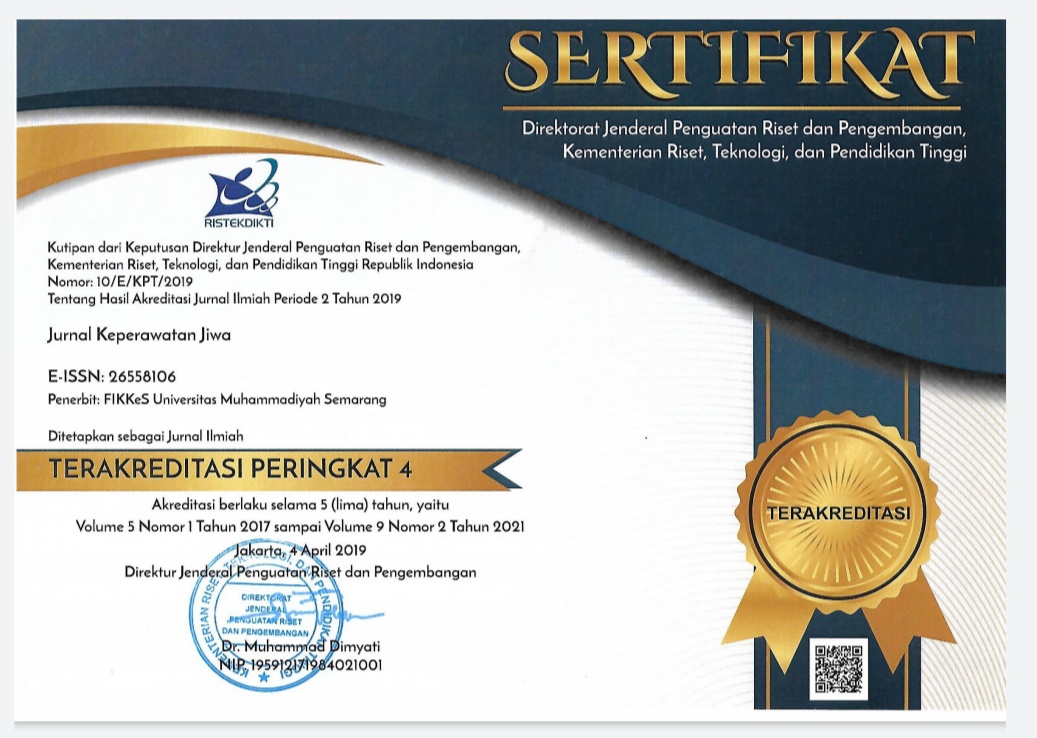Psycheducation Affecting Family Psychomotor in Treatment of the Scizofrenia Client
(1) POLTEKKES MAMUJU SULBAR
(2)
(3)
(*) Corresponding Author
Abstract
Psychosis, including schizophrenia, is the most common serious mental illness affecting 1% of the population worldwide. Family support is the most important part of the schizophrenia patient care process. Family support and motivation is very useful in care and treatment. Psychoeducation is a way of providing information and education through therapeutic communication. The purpose of this study was to determine the effect of psychoeducation on improving family psychomotor and schizophrenic clients in Mamuju district. This research is a pre-experimental study with a pre-post test design without a control group design, where one-group pretest-posttest design is designed. The population in this study were caregivers who have family members with mental disorders in the working area of Puskesmas Tampa Padang, West Sulawesi. The sample was obtained by purposive sampling totaling 23 families. The data were collected in two periods where pre-test and post-test were carried out before the intervention after the implementation of family psychoeducation, five sessions of 45 minutes each. The data were analyzed using paired t-test to determine the cognitive abilities of the family before and after psychoeducation. The results showed that there was an increase in family psychomotor abilities after being given psychoeducation with a value of p = 0.000. The conclusion is that psychoeducation in families improves family psychomotor in caring for schizophrenic clients.
Keywords
Full Text:
PDFReferences
Boyacıoğlu, N. E., & Kutlu, Y. (2017). The effectiveness of psychoeducational interventions in reducing the care burden of family members caring for the elderly in turkey: A randomized controlled study. Archives of Psychiatric Nursing, 31(2), 183-189. doi:http://dx.doi.org/10.1016/j.apnu.2016.09.01
Cheng, H. Y., Chair, S. Y., & Chau, J. P. C. (2018). Effectiveness of a strength-oriented psychoeducation on caregiving competence, problem-solving abilities, psychosocial outcomes and physical health among family caregiver of stroke survivors: A randomised controlled trial. International Journal of Nursing Studies, 87, 84-93.doi:http://dx.doi.org/10.1016/j.ijnurstu.2018.07.005
Feldmann, R., Hornung, W. P., Buchkremer, G., & Arolt, V. (2001). The influence of familial loading on the course of schizophrenic symptoms and the success of psychoeducational therapy. Psychopathology, 34(4), 192-7.
Fernando Jose Guedes da,Silva Junior, Jaqueline Carvalho, e. S. S., Claudete Ferreira de, S. M., Ana Paula, C. C., Luana Ruth, B. C., Gomes Miranda, P. I., . . . Lopes-Junior, L. (2020). Impact of COVID-19 pandemic on mental health of young people and adults: A systematic review protocol of observational studies. BMJ Open, 10(7) doi:http://dx.doi.org/10.1136/bmjopen-2020-039426
Fabian, F., Wilk, J., Kriston, L., Meister, R., Shimodera, S., Hesse, K., . . . Holzel, L. P. (2015). Effectiveness of a brief psychoeducational group intervention for relatives on the course of disease in patients after inpatient depression treatment compared with treatment as usual - study protocol of a multisite randomised controlled trial. BMC Psychiatry, 15 Retrieved from https://search.proquest.com/docview/1779860705?accountid=48290
Fristad, M. A. (2006). Psychoeducational treatment for school-aged children with bipolar disorder. Development and Psychopathology, 18(4), 1289-306. Retrieved from https://search.proquest.com/docview/201699216?accountid=48290
Fiorillo, A., Vecchio, V. D., Luciano, M., Sampogna, G., Rosa, C. D., Malangone, C., . . . Maj, M. (2015). Efficacy of psychoeducational family intervention for bipolar I disorder: A controlled, multicentric, real-world study. Journal of Affective Disorders, 172, 291-299. doi:http://dx.doi.org/10.1016/j.jad.2014.10.021
Friedman, M. (2010). Buku ajar keperawatan keluarga: riset, teori, dan praktek. edisi ke-
jakarta: egc
Grist, R., Porter, J., & Stallard, P. (2017). Mental Health Mobile Apps for Preadolescents and Adolescents: A Systematic Review. Journal of Medical Internet Research, 19(5), 1. https://e-resources.perpusnas.go.id:2116/10.2196/jmir.7332
Gusdiansyah, E. (2016). Pengaruh psikoedukasi keluarga terhadap klien dan kemampuan klien perilaku kekerasan dan kemampuan keluarga dalam merawat di rumah.(tesis). padang, universitas andalas. tidak dipublikasikan.
Haryani, S., Muntamah, U., & Astuti, A. P. (2020). Efektifitas Terapi Psikoedukasi terhadap Peningkatan Tumbuh Kembang Anak. JKG (JURNAL KEPERAWATAN GLOBAL), 5(1), 31-36.
Idaiani, Sri, and Raflizar Raflizar. "Faktor Yang Paling Dominan Terhadap Pemasungan Orang Dengan Gangguan Jiwa Di Indonesia (Factors Contributing to Shackling Practice of Psychotic People in Indonesia)." Buletin Penelitian Sistem Kesehatan, vol. 18, no. 1, Jan. 2015.
Kementerian Kesehatan. (2018). Riset kesehatan dasar tahun 2018. jakarta: kemenkes RI.
Kustiawan, R. (2015). Pengaruh pendidikan kesehatan keluarga terhadap kemampuan keluarga merawat klien HDR di kota Tasikmalaya. Media Informasi, 11(1), 66-73.
Meiser, B., Peate, M., Levitan, C., Mitchell, P. B., Trevena, L., Barlow-stewart, K, Schofield, P. R. (2017). A psycho-educational intervention for people with a family history of depression: Pilot results. Journal of Genetic Counseling, 26(2), 312-321. doi:http://dx.doi.org/10.1007/s10897-016-0011-5
Navidian, A., Kermansaravi, F., & Rigi, S. N. (2012). The effectiveness of a group psycho-educational program on family caregiver burden of patients with mental disorders. BMC Research Notes, 5, 399. doi:http://dx.doi.org/10.1186/1756-0500-5-399
Nurul F. Praharso, Hans Pols, Nikolaos Tiliopoulos, Mental Health Literacy of Indonesian Health Practitioners and Implications for Mental Health System Development, Asian Journal of Psychiatry,2020,102168,ISSN 1876-2018, https://doi.org/10.1016/j.ajp.2020.102168.(http://www.sciencedirect.com/science/article/pii/S187620182030280X)
Rummel-Kluge, C., Kluge, M., & Kissling, W. (2013). Frequency and relevance of psychoeducation in psychiatric diagnoses: Results of two surveys five years apart in german-speaking european countries. BMC Psychiatry, 13, 170. doi:http://dx.doi.org/10.1186/1471-244X-13-170
Ran, M., Chan, C. L., Ng, S., Guo, L., & Xiang, M. (2015). The effectiveness of psychoeducational family intervention for patients with schizophrenia in a 14-year follow-up study in a chinese rural area. Psychological Medicine, 45(10), 2197-2204. doi:http://dx.doi.org/10.1017/S0033291715000197
Sharif, F., Shaygan, M., & Mani, A. (2012). Effect of a psycho-educational intervention for family members on caregiver burdens and psychiatric symptoms in patients with schizophrenia in shiraz, iran. BMC Psychiatry, 12, 48. doi:http://dx.doi.org/10.1186/1471-244X-12-48.
Stuart & Laraia. (2015). Principles & practice of psychiatric nursing.7th edition. st. louise: mosby.
World Health Statistics (2017). Monitoring health for the sdgs, sustainable development goals. geneva: who.
Article Metrics
Abstract view : 463 timesPDF - 63 times
DOI: https://doi.org/10.26714/jkj.8.4.2020.521-528
Refbacks
- There are currently no refbacks.
PPNI Univ. Muhammadiyah Semarang
Jl. Kedungmundu Raya No. 18 Semarang Gedung NRC University of Muhammadiyah Semarang
Phone: 02476740287
Fax: 02476740287
Email: [email protected]
This work is licensed under a Creative Commons Attribution 4.0 International License.


